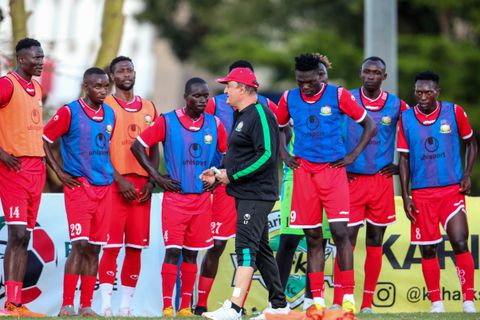Kenya’s national football team, Harambee Stars, has faced significant challenges in recent years, with inconsistent performances in both the World Cup and Africa Cup of Nations (AFCON) qualifiers.
The recent back-to-back defeats to Cameroon in the ongoing 2025 AFCON qualifiers have been a harsh reminder of the need for change.
If Harambee Stars are to regain their former glory and compete effectively on the international stage, they must go back to the drawing board and reevaluate their approach.
Jambobet is the best betting site in Kenya, offering excellent odds and a seamless betting experience for local and international competitions.
1. The Importance of Strategic Player Selection and Recruitment
One of the most critical factors influencing Harambee Stars’ performance is the selection and recruitment of players. The coaching staff must carefully evaluate players based on their abilities and potential rather than relying on popularity or celebrity status. To build a winning team, the focus should be on selecting players who complement one another and bring a variety of skills to the table.
By identifying players with the right attributes, the team can adopt a playing style that suits its strengths, improving the overall performance on the pitch. Talent scouting programs must be implemented to discover young players across various age groups. This will ensure that the national team has a continuous flow of skilled individuals, capable of enhancing the squad’s depth and quality.
2. Investment in Coaching and Training
For Harambee Stars to succeed on the international stage, there needs to be a significant investment in coaching and training. The current coaching setup, led by Engin Firat, must be bolstered with additional resources, enabling the staff to assess the strengths and weaknesses of each squad member thoroughly. This will allow for more specialized training, focused on improving individual players’ skills while also building a stronger, more cohesive unit.
Moreover, collective training sessions should be frequent, giving players the opportunity to hone their tactics and improve teamwork. The development of a clear tactical strategy that aligns with the players’ skills will be vital in ensuring that the team can compete effectively against tougher opponents.
3. Building a Strong Team Culture
Success on the international stage doesn’t just depend on individual talent—it requires a cohesive team culture built on discipline, communication, and cooperation. To achieve peak performance, Harambee Stars must emphasize the value of teamwork both on and off the field. This includes fostering a positive atmosphere within the squad, where open communication is encouraged and players support one another.
By promoting friendship and unity within the team, players will be more likely to perform well together, with their collective effort resulting in stronger performances. A positive team culture can also help the players handle pressure better, particularly in high-stakes games like World Cup and AFCON qualifiers.
RECOMMENDED:
4. Mental Toughness and Adaptability
In international football, mental toughness is as important as technical skill. Harambee Stars must invest in programs that focus on developing players’ mental resilience. These programs should aim to improve the team’s ability to stay composed under pressure, maintain focus during challenging situations, and bounce back from setbacks.
Players should be encouraged to believe in their abilities and approach each game with an optimistic mindset. By nurturing mental toughness and adaptability, Harambee Stars will be better equipped to handle the intense pressure of international tournaments, ultimately improving their chances of success.
5. Talent Scouting and Youth Development
The future success of Harambee Stars largely depends on the discovery and development of young talent. A robust talent-scouting initiative should be launched to identify skilled players across the country, particularly at the grassroots level. This would allow the team to build a pipeline of future stars who can step up when needed.
Exposure to international tournaments and build-up matches is also crucial for young players’ development.
These opportunities allow them to gain valuable experience, refine their skills, and grow into the next generation of Harambee Stars players. By investing in youth development, Kenya can build a strong foundation for the future, ensuring the national team remains competitive for years to come.
6. Tactical and Strategic Refinement
Enhancing Harambee Stars’ performance requires a multifaceted strategy that incorporates both tactical and strategic elements. The team needs to refine its playing style and tactics to ensure they can compete effectively against different opponents. This could involve experimenting with new formations, improving defensive organization, and focusing on attacking efficiency.
The coaching staff must regularly evaluate the team’s performance, making adjustments where necessary. Ongoing analysis will help identify areas for improvement, ensuring that the team continues to develop and adapt to the ever-changing demands of international football.
7. The Role of Fitness and Conditioning
Fitness is a fundamental aspect of football, particularly at the international level. To compete effectively, Harambee Stars must prioritize physical conditioning, ensuring that players are in peak shape throughout the season. This involves not only building stamina and strength but also preventing injuries that could impact the team’s performance.
Incorporating advanced fitness programs into the team’s training regimen will help players maintain high energy levels throughout matches, giving Harambee Stars a competitive edge against physically stronger opponents.





